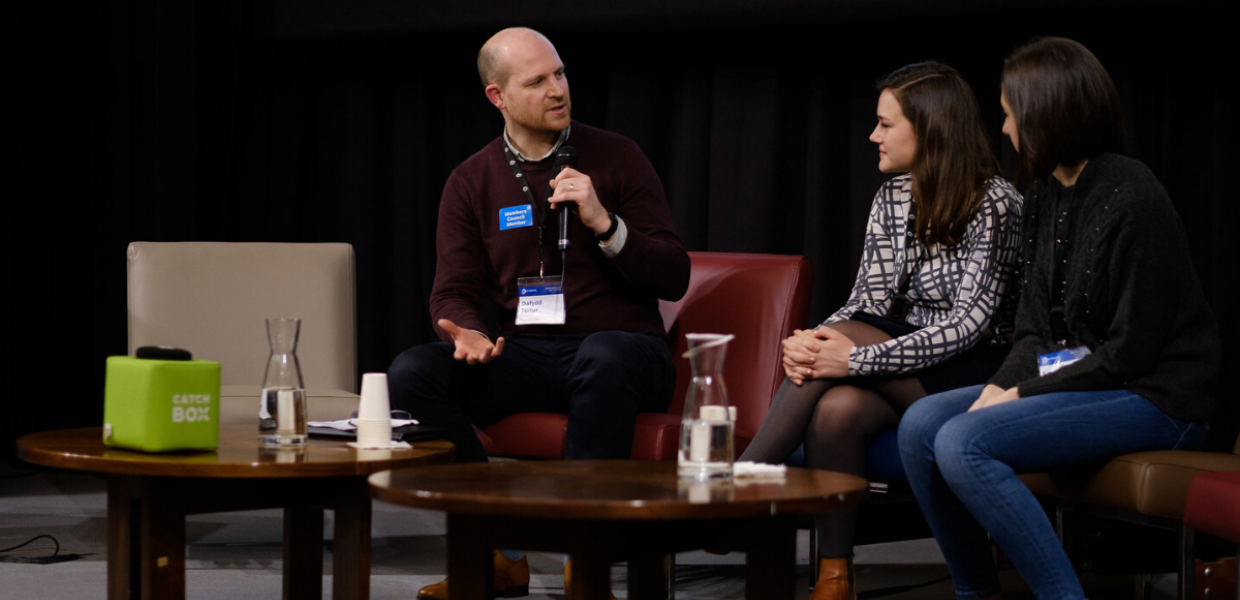Professionals in Focus: Dafydd Tudur
Europeana Members Councillors have diverse jobs and wide experience across the heritage sector, but are united by their passion for digital cultural heritage. In our ‘Professionals in Focus’ series, we speak to our Councillors about their roles, working lives and plans for their time on the Members Council. This month Dafydd Tudur, Head of Access and Public Programmes at The National Library of Wales, discusses the importance of understanding users, change at the Library and getting involved in Europeana initiatives.

- Title:
- Dafydd Tudur leading a discussion at Europeana2019 - Connect Communities, CC-BY-4.0
- Creator:
- Sebastiaan ter Burg
- Date:
- 27-29 November 2019
- Institution:
- Europeana Foundation
- Country:
- Netherlands
How did you enter your job?
It was love that brought me into this profession! I had completed my doctoral research and wanted to live nearer my girlfriend, Elin (we’re now married and have three children). I saw a post advertised for the role of Project Officer and Editor to work on digitisation projects at the National Library of Wales. The first project that I worked on just happened to be on an aspect of my PhD thesis: the story of the Welsh communities established in Patagonia during the nineteenth century. I already had a passion for history, but this role opened my eyes to the way digital technologies could be used to share the collections of libraries, archives and museums, and how they can connect people with each other and the past.
What are you currently working on?
I was recently appointed Head of Access and Public Programmes (January 2020), which extends my responsibilities to include the development of the National Library of Wales’s on-site and outreach services and programmes as well as digital access to the collections. The Library is going through a great deal of change as I step into the role. There has been extensive renovation work in the building over the past year and we’re now embarking on a project to establish a National Broadcast Archive for Wales. We’re also in the early stages of planning our next strategy, so it’s a particularly good time to be sharing new ideas and approaches.
What are some of the challenges in your role? What are some of your favourite elements?
How people create, access and use information has changed so much. For me, the challenge in terms of access and public programmes is to ensure that we continue to meet the needs of core and target users, while also pushing boundaries in engaging ways. The key is to build our understanding of those user groups, and for the flow of feedback and insight to drive a process of continuous improvement. Making these improvements can lead to a number of other challenges - technological, financial, cultural - but it is essentially about delivering value to users. Closely related is the challenge of articulating this value to stakeholders, and embedding impact practice into our work. As well as exploring ways of bringing this change to the Library, my favourite elements are meeting with users and hearing what they’ve discovered in the collections, and also sharing ideas and experiences with other organisations and cultural heritage professionals.
What was your motivation for joining the Members Council?
I still feel quite new to Europeana Network Association. My first experience of Europeana came from leading The National Library of Wales’s contribution to the Rise of Literacy project, which began in September 2017. I remember feeling inspired at the project’s kick-off meeting at the Europeana office in The Hague, meeting the project’s other partners and learning about their collections, their cultures and their ways of working. I realised that Europeana is as much about community as it is about collections. I soon became involved in other Europeana initiatives: the Impact Playbook and the Europeana Migration Collection Days. Putting my name forward for election to the Members Council at the end of 2018 felt like a natural step for me - a great opportunity to become even more involved in this community, representing the Network’s members and continuing to contribute to Europeana’s initiatives.
What do you plan to do as a Members Councillor?
I am pleased to be co-chair of the Impact Community Steering Group and much of my work as a Members Councillor will focus on the development of this community. Cultural heritage can make a difference to the lives of individuals and communities, and we need to be able to assess and articulate this impact. More generally, I will still be advocating open access and I’m becoming more interested in the work around inclusivity and diversity, while also continuing to promote and celebrate the wonderful range of collections and initiatives that can be found throughout the cultural heritage sector.


